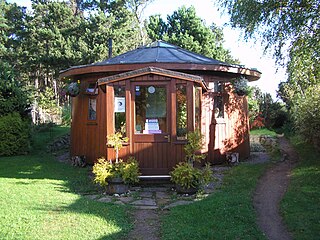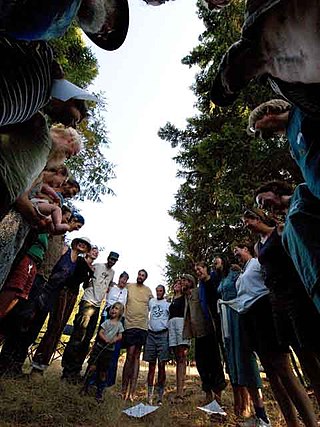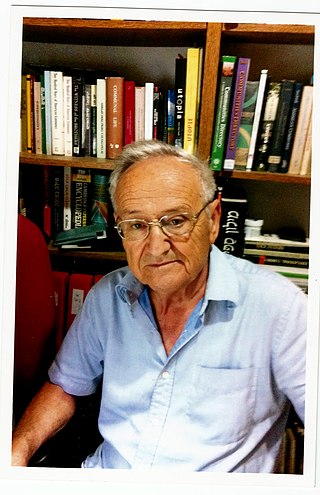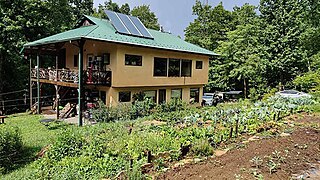Related Research Articles
A utopia typically describes an imaginary community or society that possesses highly desirable or near-perfect qualities for its members. It was coined by Sir Thomas More for his 1516 book Utopia, which describes a fictional island society in the New World.

An ecovillage is a traditional or intentional community with the goal of becoming more socially, culturally, economically, and/or ecologically sustainable. An ecovillage strives to produce the least possible negative impact on the natural environment through intentional physical design and resident behavior choices. It is consciously designed through locally owned, participatory processes to regenerate and restore its social and natural environments. Most range from a population of 50 to 250 individuals, although some are smaller, and traditional ecovillages are often much larger. Larger ecovillages often exist as networks of smaller sub-communities. Some ecovillages have grown through like-minded individuals, families, or other small groups—who are not members, at least at the outset—settling on the ecovillage's periphery and participating de facto in the community. There are currently more than 10,000 ecovillages around the world.

Hutterites, also called Hutterian Brethren, are a communal ethnoreligious branch of Anabaptists, who, like the Amish and Mennonites, trace their roots to the Radical Reformation of the early 16th century and have formed intentional communities.

Twin Oaks Community is an ecovillage and intentional community of about one hundred people living on 450 acres (1.8 km2) in Louisa County, Virginia. It is a member of the Federation of Egalitarian Communities. Founded in 1967, it is one of the longest-enduring and largest secular intentional communities in North America. The community's core values are cooperation, egalitarianism, nonviolence, sustainability, and income sharing. About 100 adults and 17 children live in the community.

The Bruderhof is a communal Anabaptist Christian movement that was founded in Germany in 1920 by Eberhard Arnold. The movement has communities in the United States, the United Kingdom, Germany, Austria, Paraguay, South Korea and Australia.

An intentional community is a voluntary residential community which is designed to have a high degree of social cohesion and teamwork. The members of an intentional community typically hold a common social, political, religious, or spiritual vision, and typically share responsibilities and property. This way of life is sometimes characterized as an "alternative lifestyle". Intentional communities can be seen as social experiments or communal experiments. The multitude of intentional communities includes collective households, cohousing communities, coliving, ecovillages, monasteries, survivalist retreats, kibbutzim, Hutterites, ashrams, and housing cooperatives.
An alternative lifestyle is a lifestyle perceived to be outside the norm for a given culture. The phrase "alternative lifestyle" is often used pejoratively. Description of a related set of activities as alternative is a defining aspect of certain subcultures.
Common ownership refers to holding the assets of an organization, enterprise or community indivisibly rather than in the names of the individual members or groups of members as common property.

The Foundation for Intentional Community (FIC), formerly the Fellowship of Intentional Communities then the Fellowship for Intentional Community, provides publications, referrals, support services, and "sharing opportunities" for a wide range of intentional communities including: cohousing groups, community land trusts, communal societies, class-harmony communities, housing cooperatives, cofamilies, and ecovillages, along with community networks, support organizations, and people seeking a home in community. The FIC is a nonprofit 501(c)(3) organization in the United States.

Findhorn Ecovillage is an experimental architectural community project based at The Park, in Moray, Scotland, near the village of Findhorn. The project's main aim is to demonstrate a sustainable development in environmental, social, and economic terms. Work began in the early 1980s under the auspices of the Findhorn Foundation but now includes a wide diversity of organisations and activities. Numerous different ecological techniques are in use, and the project has won a variety of awards, including the UN-Habitat Best Practice Designation in 1998.

Diana Leafe Christian is an author, former editor of Communities magazine, and nationwide speaker and workshop presenter on starting new ecovillages, on sustainability, on building communities, and on governance by sociocracy. She lives in an off-grid homestead at Earthaven Ecovillage in the Blue Ridge Mountains of North Carolina, U.S. She has said that living in an intentional community "is the longest, most expensive, personal growth workshop you will ever take," though others are also associated with this quotation and it's unclear who originated it.
Intentional living is any lifestyle based on an individual or group's conscious attempts to live according to their values and beliefs. These can include lifestyles based on religious, political or ethical values, as well as for self-improvement.

Awra Amba is an Ethiopian intentional community of about 463 people, located 73 kilometres east of Bahir Dar in the Fogera woreda of Debub Gondar Zone. It was founded in 1980 with the goal of solving socio-economic problems through helping one another in an environment of egalitarianism — in marked contrast to the traditional norms of Amhara society. The name means "Top of the Hill" in Amharic.

The Brotherhood Church is a Christian anarchist and pacifist community. An intentional community with Quaker origins has been located at Stapleton, near Pontefract, Yorkshire, since 1921.

Utopian socialism is the term often used to describe the first current of modern socialism and socialist thought as exemplified by the work of Henri de Saint-Simon, Charles Fourier, Étienne Cabet, and Robert Owen. Utopian socialism is often described as the presentation of visions and outlines for imaginary or futuristic ideal societies, with positive ideals being the main reason for moving society in such a direction. Later socialists and critics of utopian socialism viewed utopian socialism as not being grounded in actual material conditions of existing society. These visions of ideal societies competed with revolutionary and social democratic movements.

Yaacov Oved is a historian and Professor Emeritus in the Department of History at Tel Aviv University, member of Kibbutz Palmachim, research fellow at Yad Tabenkin: the institute of research and documentation of the kibbutz movement, researcher of the history of communes in the world and co- founder of the International Communal Studies Association.
Home Colony was an anarchist colony on Puget Sound in Washington State from 1898 to 1909. Its founders were members of a former Bellamyite colony who bought 26 acres and formally organized as the Mutual Home Association in January 1898. Colonists purchased one or two acres and the proceeds purchased new land for the colony. Its colonists lived as individuals rather than cooperatively and tolerated a wide degree of social practices, including free love, free speech. They organized few cooperative institutions aside from a cooperative store (1902), some mutual construction projects, and a weekly anarchist paper, Discontent: Mother of Progress. When the newspaper was fined for obscenity, they replaced it with The Demonstrator. The original 40 colonists grew to 91 by 1900 and 155 by 1906. The colony's numerous visiting speakers included Emma Goldman. Following 1909 changes to the association's articles of incorporation allowed land to transfer from their mutual trust to private ownership, Home declined as a cooperative community but remained a home for anarchists.

Earthaven is an ecovillage in Western North Carolina, about 50 minutes from Asheville.
References
- ↑ "Awra Amba: the anarcho-feminist utopia that actually works". 3 October 2016. Archived from the original on 11 October 2018. Retrieved 11 October 2018.
- ↑ Rosen, Kenneth R. (March 31, 2021). "Jinwar Women's Village: Carving a Progressive Enclave Amid Syria's Civil War". The Washington Institute. Retrieved 2022-12-05.
- ↑ "What is DNS?". DNS The Necessary Teacher Training College. 2018-02-08. Retrieved 2020-08-13.
- ↑ "Official Website of Friland". Archived from the original on 4 January 2019.
- ↑ "DR Friland". Archived from the original on 13 September 2012.
- ↑ "Bruderhof - Fellowship for Intentional Community". Fellowship for Intentional Community. Retrieved 2017-05-24.
- ↑ Apoifis, Nicholas (2016). Anarchy in athens : an ethnography of militancy, emotions and violence. Manchester: Manchester University Press. p. 158. ISBN 978-1-5261-0803-6. OCLC 989813040.
- ↑ "Crna Gora jes' malena…al će biti libertarijanska?". vijesti.me.
- ↑ "Las ecoaldeas en la península ibérica". news.soliclima.com (in Spanish). Retrieved 2023-03-19.
- ↑ "QUE HACER PARA VISITAR LA ECOALDEA" [What to do to visit La Ecoaldea]. Ecoaldea Vegetariana ESPIRAL (in Portuguese). 2012-06-20. Retrieved 2023-03-19.[ better source needed ]
- ↑ Sanborn, Josh (March 1996), Review of Edgerton, William, ed., Memoirs of Peasant Tolstoyans in Soviet Russia, H-Russia, H-Review, archived from the original on June 21, 2018, retrieved October 7, 2018
- ↑ "Lakabe Ecovillage | GEN sites". sites.ecovillage.org. Retrieved 2016-05-12.
- ↑ "Familiafeliz | .EU". www.familiafeliz.eu. Retrieved 2024-04-12.
- ↑ Dodd, Liz (5 December 2014). "UK initiatives seek monastic renewal". National Catholic Reporter . Vol. 51, no. 4. Retrieved 15 January 2019– via The Free Library.
- ↑ See "crass retirement cottage," nest magazine #21, summer 2003, pp 106-121
- ↑ "Rubha Phoil |". www.rubhaphoil.org. Retrieved 2023-07-31.
- ↑ Hardy, Dennis (2000). Utopian England: Community Experiments, 1900-1945. Psychology Press. p. 181. ISBN 978-0-419-24670-1.
- ↑ Franks, Benjamin (2006). Rebel Alliances: The Means and Ends of Contemporary British Anarchisms. AK Press/Dark Star. p. 4. ISBN 978-1-904859-40-6.
- ↑ Headley, Gwyn; Meulenkamp, Wim (1999). Follies, grottoes & garden buildings. Aurum. p. 250. ISBN 9781854106254.
- ↑ "Lifechanyuan International Family Society". Lifechanyuan International Family Society.
- ↑ "Dancing Rabbit Ecovillage – Communal Living | Sustainable Living | Community Living". www.dancingrabbit.org.
- ↑ "Enright Ridge Urban Ecovillage". Enright Ridge Urban Ecovillage.
- ↑ Osborne, Domenique (9 November 2002). "Radically wholesome". Metro Times . Archived from the original on 30 March 2011. Retrieved 13 April 2011.
- ↑ Martin, James J. (1970) [1953]. "The Colonial Period: Utopia and "Modern Times"". Men Against the State: The Expositors of Individualist Anarchism in America, 1827-1908. Colorado Springs: Ralph Myles Publisher. pp. 56–64. ISBN 9780879260064. OCLC 8827896.
- ↑ "Inside radical christian sect". Mirror. Retrieved 2019-10-26.
- ↑ "Bryn Gweled Homesteads Welcome Page". bryngweled.org. Retrieved 2020-01-13.
- ↑ Writer, Alan J. Heavens, Inquirer Real Estate (26 April 2015). "At Bryn Gweled Homesteads, intentionally making a community for 75 years". The Philadelphia Inquirer. Retrieved 2020-01-13.
{{cite web}}: CS1 maint: multiple names: authors list (link) - ↑ "An Experiment in Anarchy: Modern Times, the notorious and short-lived utopian village that preceded Brentwood". Archived from the original on 9 August 2014.
- ↑ "Searching For Happiness In 'Utopia'". Huffington Post . Archived from the original on 3 March 2016. Retrieved 11 March 2016.
Acorn Community Farm [is] a self-described "farm-based, anarchist, eco-conscienced, secular, egalitarian community"
- ↑ "Pentecostal Monasticism: Communities of the Spirit Both Past and Potential". February 5, 2020.
- ↑ "Heathcote Community". www.heathcote.org.
- ↑ Robinson, Paul (2019-06-03). "Community at its finest: Alpha Farm provides a tight-knit cooperative outside Eugene". Daily Emerald. Retrieved 2023-03-19.
- ↑ "Avalon Organic Gardens & EcoVillage". Global Ecovillage Network. 2022-03-14. Retrieved 2023-03-19.
- ↑ Blust, Kendal (2023-02-13). "EcoVillage residents live apart, reach out". Nogales International. Retrieved 2023-03-19.
- 1 2 LeWarne, Charles Pierce (1975). Utopias on Puget Sound: 1885–1915. Seattle: University of Washington Press. pp. 168–226. ISBN 0295974443.
- ↑ Fimbres, Gabrielle (2023-03-10). "Stone Curves turns 10 with strong sense of community". Arizona Daily Star. Retrieved 2023-03-19.
- ↑ Marshall, Peter H. (1993). Demanding the Impossible: A History of Anarchism . London: Fontana Press. pp. 507–508. ISBN 978-0-00-686245-1. OCLC 1042028128.
[I]n 1890 Dr Giovanni Rossi, an Italian agronomist, founded in the famous Cecilia colony in Parana one of the first anarchist communities in Latin America.